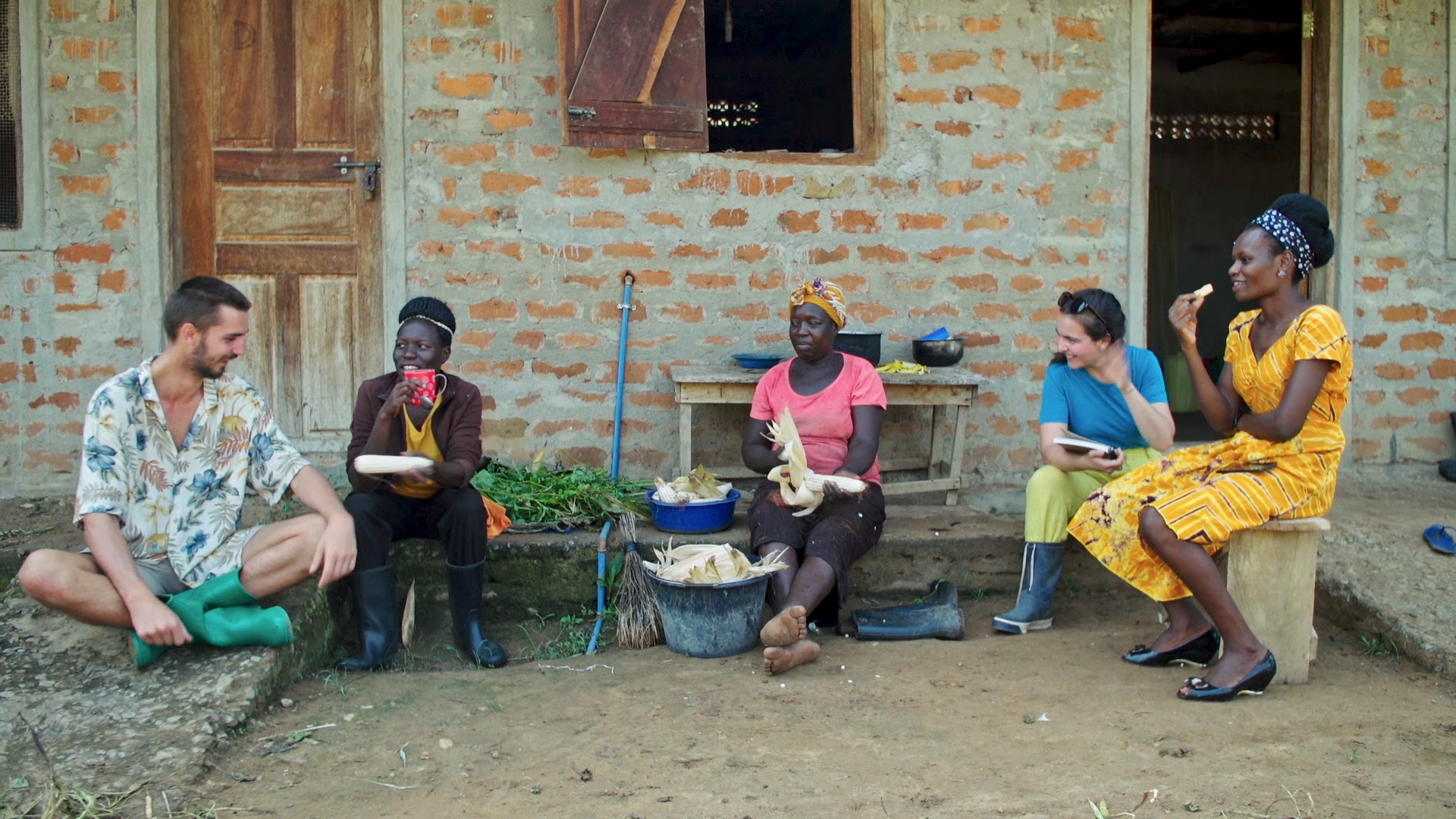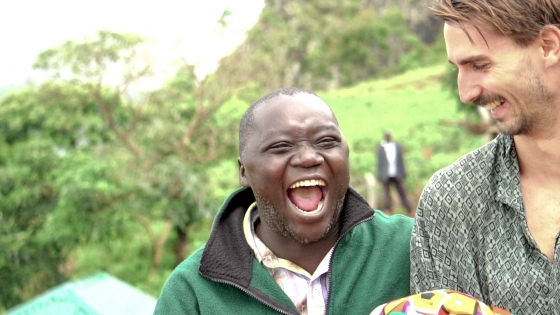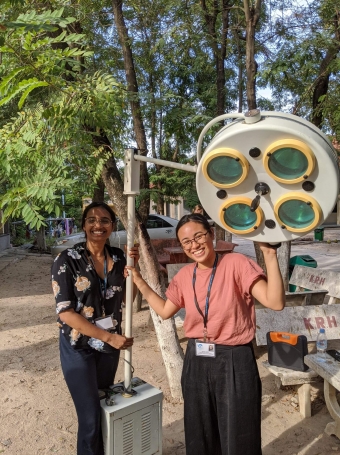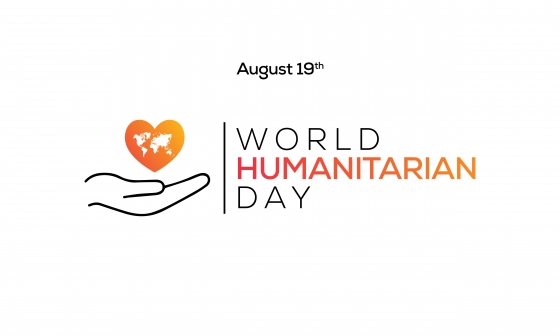
Every year on World Humanitarian Day (WHD), we recognise the sacrifices made by humanitarian workers across the world, as well as the hardships faced by those in need of humanitarian assistance.
WHD is designated by United Nations every year on August 19 – to commemorate the anniversary of the 2003 bomb attack on the Canal Hotel in Baghdad, Iraq, that killed 22 humanitarian aid workers.
This year’s WHD theme is marked by #TheHumanRace and aims to highlight the immediate consequences of the climate emergency for the world’s most vulnerable people and ensure that their voices are heard.
The United Nations Office for the Coordination of Humanitarian Affairs (OCHA) says a record 235 million people will need humanitarian assistance and protection in 2021, a staggering nearly 40 per cent increase on 2020 due to the added burden on COVID-19 on the poor, displaced and disadvantaged.
UNSW is thankful to partner with humanitarian workers and international development experts in both the delivery of humanitarian engineering education and research activities, working together to improve the lives and livelihoods of the disadvantaged.
We asked individuals associated with the Humanitarian Engineering program at UNSW what World Humanitarian Day (WHD) meant to them:
I was working in Iraq with the United Nations on the 19th of August 2003, when the UN HQ at the Canal Hotel in Baghdad was blown up by a suicide bomber. World Humanitarian Day is a time to reflect, and remember the huge contribution and sacrifice of those who died, and many of my colleagues who sustained horrific injuries, while working to provide vital humanitarian assistance to those in need.
Mark Tell
Training Manager, RedR Australia
To remind the world to support those that help others affected by disasters, conflict and displacement
David Sanderson
Professor, inaugural Judith Neilson Chair in Architecture. Lead, Institute for Global Development
For me, World Humanitarian Day is an opportunity for the limelight to be cast on the importance of humanitarianism and the critical role it plays in improving the lives of so many across the world. This year, in light of the recently published IPCC report, it is especially important that we emphasise how we must step up to provide increased support for the communities most vulnerable to the impacts of climate change, who are suffering and will continue to suffer because of the past and current carbon intensive activities of wealthy, developed countries such as Australia. World Humanitarian Day is also a day to recognise the groups and individuals who have dedicated their careers to the humanitarian field. As a budding engineer these people inspire me, and I hope to find a career as meaningful and important as theirs.
Breisha Conlan
Fourth Year Environmental Engineering Student, UNSW
A time to stop and remember the millions of people around the world who have devoted themselves to working on difficult issues in often dangerous places to try and make the world a better place.
Justine Nolan
Director, Australian Human Rights Institute UNSW
WHD is a time to reflect on how we, as engineers, can share our expertise more equitably, placing people and the natural environment at the centre of our work.
Clare Stephens
Postdoctoral Research Fellow, Hawkesbury Institute for the Environment
World Humanitarian Day is a reminder for me that the sharing knowledge is the best way to connect and collaborate. Participating in projects with an international humanitarian focus is a very important aspect of our work on water treatment. The engagement affords the opportunity to learn from different cultures, share experiences and knowledge and to understand and appreciate different ways of working and making decisions about what is valuable. Our experience working with UNSW Impact Engineers working in Sri Lanka on groundwater treatment was a chance to see how community led programs succeed and overcome the problems that normally derail projects that are designed and delivered with minimal community input. World Humanitarian Day is a reminder for me that the sharing knowledge is the best way to connect and collaborate.
Professor Greg Leslie
Director, UNSW Global Water Institute
World Humanitarian Day, to me, means institutions working in unison to deliver evidence based solutions that improve livelihoods of the most vulnerable. With this year’s theme, “a global challenge for climate action in solidarity with the people who need it most”, its paramount to design and scale up new innovative models or technologies for the most vulnerable to ensure low carbon emissions into the atmosphere whilst enabling them to meet their everyday needs such as clean water and food.
Alicwamu Moses
Programs Manager – African STEM Education Initiative (ASEI), Uganda
A day to remind us of the altruistic heroes and the underprivileged alike.
Mhway Mhway Khin Soe
Undergraduate student, UNSW
World Humanitarian Day reminds me of the challenges many of our fellow citizens of the world, the disadvantaged, marginalized or vulnerable face in their everyday lives. In our crisis ridden world, armed conflict, COVID, Climate Change, floods, and earthquake to name a few of the crises within crises that we must address with all our energy and expertise.
Professor Robert Care AM
Chair RedR Australia and RedR International
Professor of Practice, UNSW
Chair Community of Practice for Humanitarian Engineering, Engineers Australia
It is a chance to pause for a moment and recognise not just those people in greatest need around the world, but also those who dedicate their lives to helping them.
Andy Symington
PhD Candidate, Faculty of Law and Justice, UNSW
Supporting people who need it most has always been a passion of mine and most definitely resonates with a majority of other university students. World Humanitarian Day provides us with a stimulating opportunity to understand various humanitarian challenges and participate in making an immediate change. It is inspiring to witness the limitless world of humanitarian work, and acknowledge that no matter the discipline of engineering there is always a way to make a change and put our skills to use in the humanitarian sector.
Poornima Ajetrao
4th Year (Undergraduate) Mechanical & Biomedical Engineer, UNSW
To me, it’s about using our skills, knowledge, and opportunity to improve the lives and environments of those who don’t have the same privileges we have had. It’s about what we can purely for the good of other communities and hoping to inspire and give those same opportunities to future generations. About making the world better for those who come after us.
Eliza Falkenmire
Final year mechanical engineering student, UNSW
To me, World Humanitarian Day means taking pause and remembering we share the planet with beautifully rich and diverse people and cultures – and that our shared humanity should drive compassion, solidarity, and aid to one another. While celebrating our humanitarian efforts, it is also about drawing attention to alarming global and local inequality, demanding renewed energy, people, and politics. In the face of a rapidly warming climate, and crises that exacerbate inequality, this is more important than ever.
Niall Earle
Student, School of Chemical Engineering and Faculty of Arts and Social Sciences, UNSW
This day provides a chance for everyone to reflect back on the humanitarian mission around us and to connect with the people who pursue the same mission, especially in humanitarian engineering field.
Ameeruddin Suliman
Co-President, Engineers Without Borders, UNSW
World Humanitarian Day is now synonymous with #TheHumanRace, which is a global challenge for climate action and those made most vulnerable by climate change. Humanitarian action has long been about reacting to uncertain scenarios with the best possible response; in this way I believe that humanitarian design may well become a benchmark for climate change response in an increasingly unpredictable future. I believe humanitarian action represents some of the best qualities that humanity has to offer, and in particular its ability to address real world issues as swiftly and with as little red tape possible is a model that more global infrastructure should adopt.
Dr James Hayes
Research Associate in Civil and Environmental Engineering, course co-ordinator for International Humanitarian Response, UNSW
World Humanitarian Day is a chance to reflect on the amazing work done around the world to address the basic needs of people who are living in poverty or are escaping disasters or conflict. Humanitarians see the problems facing people around world and instead of turning away, face the challenges to try to make the world a better place for everyone to live.
Associate Professor Fiona Johnson
School of Civil and Environmental Engineering, UNSW
A vital acknowledgement of the need for compassion and support across our globe. For me, by recognising, seeking and promoting the welfare of human lives no matter where in the world they are, without discrimination or judgement is what makes a humanitarian. In our own backyard, we can all advocate and act as an agent of change for current and future generations. Humanity has an endless capacity to do good and to do better, and this year’s theme is calling out that capacity to be turned into action. It is our responsibility to dig into that capacity so that every single person across the world is standing in the face of a brighter future.
Rebecca Lloyd
CEO, Love Mercy Foundation
World Humanitarian Day is an important occasion that allows us to recognise the incredible commitment the global humanitarian workforce provide to the world. Driven by a need to realise equity, opportunity and hope for others, humanitarian workers put the lives of strangers well before their own on a daily basis. This year WHD focusses on the global climate crisis and the need for international leaders to commit to change. In Australia this is particularly difficult as we experience the real effects of this crisis both here and in neighbouring countries, and yet our leaders show such little leadership. Instead, we look to those from the humanitarian sector, environment, innovation and renewable energies to realise this change without the support of our leaders, for the good of humanity both now and in the future. For me personally, as I embark on welcoming a new child to my family, WHD is a chance to reflect on the actions I need to be demonstrating to my children, and the ways I need to be working to ensure they have an inherent commitment to others, both through compassion, and activism.
Hannah Sheridan
Manager, Institute for Global Development, UNSW
World Humanitarian Day reminds us that the true essence of knowledge-solution is to address basic needs and restore human dignity, particularly of the marginalised and disadvantaged communities and Humanitarian Engineers are becoming the new beacon of hope for the millions worldwide in need of humanitarian assistance.
Danladi Yunana
Scientia PhD Scholar, Chemical Engineering, UNSW
It is an injustice that those who have contributed least to the global climate emergency are going to be hit the hardest by its effects. The likelihood and severity of humanitarian crises are worsened by climate change. I am glad that World Humanitarian Day is drawing attention to this injustice and hope it motivates governments and organizations to take dramatic action now to reduce the effects of climate change as this early effort will pay for itself many times over in lives and livelihoods saved.
Sam Johnson
Transport Analyst, World Bank
Humanitarian workers frequently take on huge amounts of personal risk and responsibility to deliver life-saving services in times of crisis.
The contexts in which they work are often remote, harsh, unpredictable, and at times dangerous. The work is not glamourous, it is often confronting and sometimes isolating.
Each year, there are also numerous new reports of humanitarian workers being attacked, and many are tragically killed while in service. But they are not forgotten.
Their families and colleagues continue to remember them daily.
To me, a key role of World Humanitarian Day is in providing an annual occasion not only for close friends and family, but for humanitarian organisations and the wider global community to take a moment to reflect, remember and be grateful to those individuals.
It is also a day to highlight that humanitarian relief is still and will only continue to be ever more needed as we face continued conflict and growing climate-related crises.
It is a day to consider if there something more that you, your organisation or your government could be doing to strengthen our global humanitarian responses?
Kirsten Ridley
Senior Project Coordinator, UNSW Institute for Global Development
----------------------------------------------------------------------------------------------------------
This article was prepared by Dr. Andrew Dansie, Senior Lecturer in Humanitarian Engineering in the School of Civil and Environmental Engineering, who would like to thank the supporters, students and partners of the humanitarian engineering program at UNSW for their contributions to this article and humanitarianism at UNSW.



